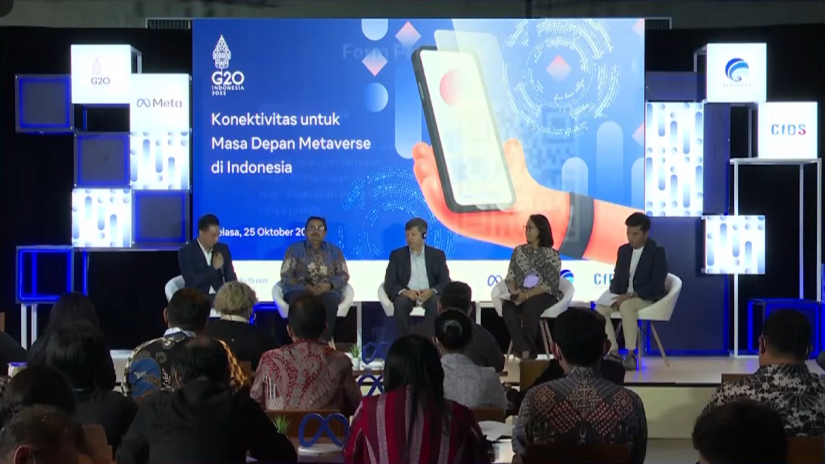
Jakarta, October 25th 2022─Center for Digital Society (CfDS) Fof FISIPOL UGM again collaborated with Meta in holding a talk show entitled “Connectivity for the Future of Metaverse Indonesia” on Tuesday (25/10) at KAUM Jakarta. The event, which was supported by the Ministry of Communication and Information (Kominfo) of the Republic of Indonesia, is a form of support for the G20 Indonesia Presidency and one of a series of events supporting the G20 Digital Economic Working Group (DEWG). The discussion on Metaverse was opened by Dedy Permady, the Alternate Chair DEWG G20 and Rahima Abdulrahim, Director of Public Policy Meta for Southeast Asia. The opening of the event was followed by a panel discussion filled with various speakers, namely Dr. Ir. Ismail, Director General of Postal and Information Technology Equipment Resources; Ismail Shah, Head of Meta Connectivity and Access Policy; Muhammad Arif, Chairman of APJII; and Nies Purwati, Senior Director of Government Affairs at Qualcomm International.
The digital ecosystem and the Metaverse will continue to develop and innovate in the future. For that, preparing reliable connectivity infrastructure is a crucial thing to do. “We have to think about how local ecosystems in Indonesia can contribute to the Metaverse that can benefit the people of Indonesia,” said Rahima, opening the discussion.
The journey to achieve the realization of the Metaverse in Indonesia is still long and has a steep road. As stated by Dr. Ismail, one of Indonesia’s challenges lies in the geographical conditions that make it quite difficult to make connectivity evenly distributed. For this reason, the government has several important roles, especially in terms of regulation. “The government must prepare regulations that are friendly to investment and encourage efficiency,” said Ismail. In addition, according to Ismail, the government must also be prepared to budget for investment to build infrastructure.
Nies agrees with Ismail’s opinion. The new Metaverse service can be fully enjoyed and utilized by the community if it has adequate broadband infrastructure. One way that can be done is through fiber optics, but this requires a long duration and is expensive. “Another way that can be done is through wireless broadband technology and 5G technology,” said Nies. Arif also emphasized that the increase in fixed broadband penetration is crucial considering that currently, the penetration rate is still below 15%.
“We need a wider band, with more stable quality and must be very massive,” said Arif.
To achieve equitable connectivity, there are several components that must be prepared. According to Shah, these components include devices, more sophisticated WiFi networks, cellular or fiber networks, to underwater cables. These components can not only ensure good connectivity, “Each component also has economic benefits for Indonesia,” said Shah.
